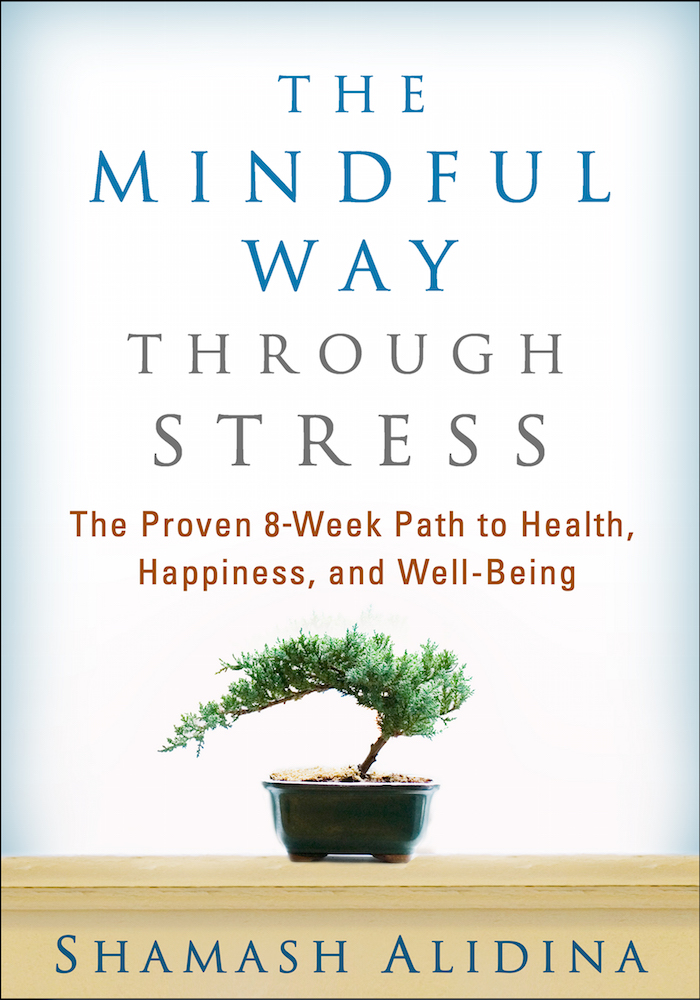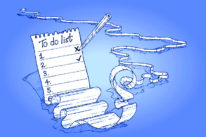 Update – The winners for this giveaway have been chosen:
Update – The winners for this giveaway have been chosen:
In my high school yearbook’s class prophecy, it was predicted that I would one day write and star in a one-woman show about my life called “Stress.”
I was chronically frazzled—in a constant state of panic about everything I had to do and had already done but may not have done well enough.
I overextended myself, took very little time to nurture my emotional and mental well-being, and frequently felt like I was about to snap.
In fact, I even broke a stress ball once from excessive squeezing. It was made for that, but apparently not with the force in my freakishly strong little hand.
Fortunately, I eventually discovered mindfulness, which was life-changing for me. It helped me step outside of my anxious thoughts so I could respond to life more consciously and calmly.
Since I’ve been more stressed than usual as of late—and I’ve needed a reminder of how to effectively manage my emotions—I was thrilled to receive a copy of Shamash Alidina’s new book, The Mindful Way Through Stress.
The subtitle promises a proven eight-week path to health, happiness, and well-being—and the book delivers!
It’s clear that Shamash is not only an expert on mindfulness, but he’s also quite passionate about helping others respond wisely to life’s inevitably stressors instead of getting caught in a frenzy of reaction.
I highly recommend The Mindful Way Through Stress to anyone who’d like to find more peace within the chaos of daily life.
It is, hands down, the most helpful guide I’ve read in a long while, and one I will certainly reference whenever I need a little help dealing with life’s inevitable challenges.
I’m grateful that Shamash took the time to provide some incredibly detailed answers to my questions about stress and mindfulness, and that he’s provided two free copies of The Mindful Way Through Stress for Tiny Buddha readers.
The Giveaway
To enter to win one of two free copies of The Mindful Way Through Stress:
- Leave a comment below
- For an extra entry, tweet: Enter the @tinybuddha giveaway to win a free copy of The Mindful Way Through Stress http://bit.ly/1M3wBvL
You can enter until midnight PST on Friday, March 6th.
The Interview
1. What brought you to your career as a mindfulness teacher and coach?
I originally got interested due to stress. The stress for me when I was in college, aged twenty, came from a combination of workload and confusion.
I didn’t know what to do. I was halfway though a degree that I didn’t enjoy (Chemical Engineering), and working toward a job I knew I didn’t want (working in the Oil Industry).
Then, my fortunes changed. I came across a class in “practical philosophy” in which the teacher guided a short mindfulness meditation. I was pleasantly shocked!
Just a short few minutes and I’d gone from feeling frazzled to focused. Wow! Why hadn’t anyone taught me this technique years ago?
I resolved from that day on to teach mindfulness to as many children and adults that I could.
I started by teaching in a school for eight years, where all the children had time to practice mindfulness and meditation. And then I moved on to focusing on just teaching adults mindfulness full-time.
Training mindfulness teachers to embody both awareness and compassion, for themselves and their students, is my passion.
2. Your book presents a self-help version of mindfulness-based stress reduction. Can you tell us a little about MBSR and how mindfulness helps with stress?
Mindfulness-based Stress Reduction was developed in the late seventies by Dr. Jon Kabat-Zinn and his colleagues at UMASS Medical School. He asked his colleagues, doctors, to send him their most challenging patients—those that they felt they could no longer help using modern medicine.
He put together an eight-week course, which comprised of guided meditations, mindful yoga stretches, and group dialogue around managing stress and living life in a mindful way.
His experiments worked. The groups reported huge reduction not only in stress, but also reductions in anxiety, depression, and chronic pain, and a greater feeling of control of their lives.
Even more encouragingly, these positive reports of stress reduction from patients continued even three years after they’d done the MBSR program.
So naturally, MBSR began to spread, first, across the US and now, worldwide. Hundreds of thousands of people have probably done the program now, if not millions.
Stress is a complex subject, and so the path to relieving it is not straightforward. However, there’s a few key, powerful ways in which mindfulness can reduce stress.
Mindfulness helps you to switch off your normal, habitual, automatic reactions to the stressors you face.
If you’re living mindlessly, you don’t even know how stressed you are.
A friend of mine recently started practicing mindfulness and has discovered his body is riddled in tension and is now slowly beginning to relax. Without mindfulness, he’d still be going around with this chronic tension in his body.
So with mindfulness you can see if you’re getting excessively stressed early, and step out of that stream. You know how to rest your mind and body. Without mindfulness, you don’t have access to that.
Mindfulness makes your brain more resilient to stress.
People who have practiced mindfulness have brains that don’t seem to ruminate so much; they can spot negative, repetitive thinking earlier, and step out of it. Or sometimes, worries just don’t seem to take hold. Sounds good, doesn’t it?
Mindfulness naturally engages the relaxation response in your body.
This is a hard-wired system. By combining mindful awareness with a sense of warmth toward different sensations, emotions, or even situations in your life, the stress inevitably eases.
You make fewer mistakes.
If you’re rushing around mindlessly, you’re going to bump into a lot of things, both physically and metaphorically. So many of us are running through life, causing more problems as a result. The running is due to fear of missing out, or being imperfect.
Mindfulness shows you how to access a peace within so you don’t have to run for it everywhere you go. By discovering a different way of operating, which everyone can do step-by-step, you meet life with greater calm, peace, joy, and freedom.
But remember, stress by itself is not bad. Stress is a problem if it’s sustained for too long and feels like it’s too much for you. See the positive aspects of stress—how it energizes you and gets you going. Seeing stress negatively makes things worse.
Make friends with stress! Stress is inevitable. Just use mindfulness to take regular breaks from your stress to recharge yourself. Then out you go again!
3. What are the problems with living on autopilot?
Living on autopilot is great for planes, but not for human beings.
When we were babies and young children, we didn’t really live on autopilot. We lived each day fresh, alive, in the moment. That’s a natural way to be.
But the human brain is clever. To save energy, rather than keeping your conscious, it switches off consciousness for any repeated activity.
Eventually your whole life is one big autopilot experience. You’re like a robot. And this kind of living reduces your joy and freedom tremendously.
The thing is, living consciously is so enjoyable once you discover how! The feeling of your own body is beautiful. Just experiencing sitting and breathing can be blissful.
The present moment really is a wonderful moment once you discover how to penetrate the crust of thoughts that is pasted over everything.
You can do it. Everyone can do it. You just need to create the right environment, follow the right instructions, and bring the right attitude—patience, kindness, curiosity, and allow the mindfulness and compassion to rise.
Just as the sun rises in the morning, bringing light and warmth, so your life becomes a joy as mindfulness and compassion grow. By prioritizing mindfulness practice in your life, you can experience this.
4. With our increasingly busy lives, many of us end up multitasking and feeling stressed as a result. How can we challenge this instinct to multitask without falling behind with everything we need to do?
The busier you are, the slower you need to go. Watch people like the Dalai Lama—do you see him rushing around in a panic? Yet, he’s constantly teaching, coaching, serving. He’s probably much busier than you or me.
The urge to multitask is powerful. And if you’re on autopilot, you’ve got no chance to release yourself from the hold of phones, computers, and tablets. In our digital age, mindfulness is essential to prevent you being swept in an ocean of information and people wanting to connect.
Try small steps like keeping your digital devices out of the bedroom. Or keep them off in the evenings. But try and take a bigger step if you can—leave your phones behind on vacation. Take one day off every week totally free of multi-tasking. A digital detox day!
Here’s one approach you can take to dealing with an excessively long to-do list:
- Before going to bed, jot down all the key things you wish to complete the next day.
- Prioritize them. What’s number 1? What’s number 2? Rewrite the tasks in the correct order. Put mindfulness at the top of the list!
- The next day, resist the urge to check emails, Facebook messages, Twitter, etc. By resisting this urge, it diminishes. Just because you have a compulsion to check your messages, you don’t need to actually check them—they can wait.
- Do the task you need to complete, in the order you set out. And write down the time you start and finish each task. Having a written record will help you to see how you’re really using your time. It’s more power than it sounds—do try it out!
- Between tasks, practice mindfulness. Feel some breaths, go for a mindful walk, slowly and consciously drink a glass of water, or stretch. These breaks with rejuvenate you and make you finish your tasks sooner (so you have more time to meditate every day).
5. You wrote, “Emotions are not problems to be solved. They are experiences to be felt.” Can you elaborate a little on this?
This is a very important point to understand. Misunderstanding how to manage emotions is at the root of so much human suffering.
Let’s take the example of feeling sad. If you’re feeling sad, what do you do? If you’re on autopilot, you try to fix it. You may think, “I must feel better.” So you go off and try and cheer yourself up. You don’t let yourself actually feel the sadness.
Now, that may work or may not. If it works for you, great. But what if it doesn’t work? What if partying with your friends doesn’t make you feel better? Or calling your sister doesn’t seem to lift the mood?
Well, your next thought will probably be, “Oh no. I’m still feeling sad. I must try something else. I must try harder.” Eventually, this turns into thoughts like, “What’s wrong with me? I should be happy.’
All this is hard work. You work harder and harder to fix your mood. But that’s not what your emotion wants.
Emotions need skillful awareness and care. Just like a young child needs attention and love to grow in a healthy way, so do emotions. So you need to feel the emotion.
Feel the emotion in your body. Notice its shape, maybe its color or texture. And bring some feeling of care toward the feeling. Place your warm hand on the sensation. Breathe and feel the emotion.
You can even speak gently to the emotion and ask, “What do want to say to me?”
One of my students did this the other day, and the response was a clear: “Slow down!” She discovered that she needs to slow down the pace of her life or things will get worse. That’s wisdom in action.
So emotions don’t need to be fixed or pushed away. They need to be gently felt—then they’ll dissolve and pass away in their own time.
6. Why do we tend to dwell on the negative, and how can we challenge this instinct to minimize our stress?
If you had a lovely day all day, but for one minute someone said to you, “You’re a complete idiot! You’re stupid, useless, and a waste of space!” then you’ll remember that. You’ll think about that much more than the thousands of other minutes that were absolutely lovely.
That’s because our brains are evolved to be like Teflon for positive experiences and Velcro for negative experiences.
Scientists think this focus on negativity, called negativity bias, is a way to ensure we survive—if you spotted a tiger on the way back to your cave, you need to be able to remember that! If not, next time you could be dinner!
You’re probably not reading this blog in a jungle. So, you need to re-balance your brain. The solution: find your favorite daily way to focus on what’s going well in your life. This could be combined with your daily meditation practice.
At the end of the practice, ask yourself, “What’s going well in my life?” Or, “What’s awesome about me?” Or, “How have I been a nice person today/yesterday/this week?”
Ask yourself positive questions like those above, and they’ll draw positive thoughts and emotions from within you.
7. What is one simple mindfulness exercise anyone can do whenever they’re feeling stressed?
This is a powerful one for most people, originally developed by meditation teacher, Ajahn Brahm:
- Sit comfortably and close your eyes.
- Imagine you’re holding two heavy suitcases in your hand. The left one represents your past and all your experiences, both positive and the regrets. And the right one represents your future and all your hopes, dreams, worries, and anxieties.
- Feel the weight of holding these bags around all day. It’s tiring. You need a break from time to time.
- Lower down the bag in your left hand, onto the ground. Enjoy the feeling of letting go as the weight transfers to the ground.
- Lower down the bag in your right hand, representing your future.
- Enjoy staying in between the past and future, in the present moment. What a relief that is!
- Connect with any present moment experience. Your body, your breath, sounds around you.
- When you feel you’ve had a rest and ready to resume, you can re-engage in your everyday activities. Ideally with some more mindful awareness and kindness to yourself and those you meet.
You can learn more about The Mindful Way Through Stress on Amazon here.
FTC Disclosure: I receive complimentary books for reviews and interviews on tinybuddha.com, but I am not compensated for writing or obligated to write anything specific. I am an Amazon affiliate, meaning I earn a percentage of all books purchased through the links I provide on this site.
About Lori Deschene
Lori Deschene is the founder of Tiny Buddha. She started the site after struggling with depression, bulimia, c-PTSD, and toxic shame so she could recycle her former pain into something useful and inspire others to do the same. You can find her books, including Tiny Buddha’s Gratitude Journal and Tiny Buddha’s Worry Journal, here and learn more about her eCourse, Recreate Your Life Story, if you’re ready to transform your life and become the person you want to be.
- Web |
- More Posts













 Though I run this site, it is not mine. It's ours. It's not about me. It's about us. Your stories and your wisdom are just as meaningful as mine.
Though I run this site, it is not mine. It's ours. It's not about me. It's about us. Your stories and your wisdom are just as meaningful as mine. 